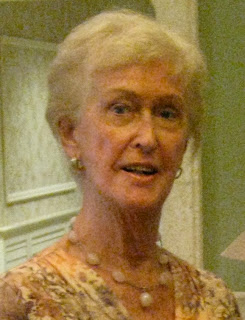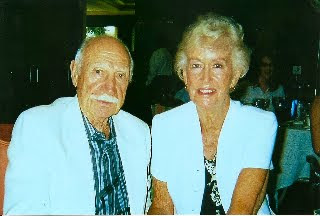Posted by Dr. El - October 27, 2010 - Business Strategies, Inspiration
Part Two of a Three Part Series
Part Three — Medical Cost Offset: The Role of Psychology at Signature HealthCARE)
I wasn’t expecting to write a post on Signature HealthCARE, but I was impressed by what I read during my research on the International Center for Long-Term Care Innovation and by my interview with E. Joseph Steier, III, President and CEO of Signature HealthCARE. Long-term care is multi-faceted and fascinating to me, and I often feel facilities could be taking greater advantage of opportunities for research, learning, and spiritual growth. I was excited to hear that Signature HealthCARE is doing just that.

E. Joseph Steier, III, President & CEO of Signature HealthCARE,
with John Reinhardt, President & CEO of the International Center for Long-Term Care Innovation, which works in partnership with Nucleus and the University of Louisville
- Intra-preneurship, which refers to the development of businesses aligned with their nursing facilities, such as home and community based services and their furniture company.
- Learning, which is manifested through a monthly podcast by Steier that’s available to all employees via the company intranet and numerous on-site and off-site meetings. For example, they have an annual “learning congress” for top management, and a five-day “CEO school” for facility administrators, taught by Steier himself. “Best practices” to improve resident and staff quality of life are shared between facilities, and the company is increasing its learning focus through other initiatives, including establishing an Institute of Long-Term Care Studies.
- Spirituality, which is incorporated into facility life by including nondenominational chaplains at morning clinical meetings, care plans, and other quality improvement meetings, in addition to providing services to residents and their families.
Smaller organizations can easily use some of these ideas, such as sharing best practices and increasing communication between the CEO/administrator/owner and employees.
By opening themselves up to social media like My Better Nursing Home, Signature HealthCARE has the opportunity to manifest their pillar of learning through their response to comments, positive and negative, that can inform their practices.
Posted by Dr. El - July 13, 2010 - Business Strategies, Depression/Mental illness/Substance Abuse, Resident care
I refer my residents to therapeutic activities every day. I consider them a vital adjunct to my work as a psychologist. Here’s why:
- Therapeutic recreation reverses the downward spiral of depression. There’s a theory that when we’re depressed, we stop doing the things we enjoy, thus leading to more depression. In order to become less depressed, we need to engage in activities we used to find pleasurable, even if we don’t feel like it. Once we do something fun, it energizes us enough to take the next pleasant action, thus leading to an upward spiral out of depression.
- Structured days are happier days. I suppose there are people who flourish with nothing much to do, but in my experience, most people feel better when they have plans. Residents who sit in their rooms all day tend to ruminate on the negative. As the saying goes, “When I’m in my head, I’m in a bad neighborhood.” I encourage residents to find at least two activities each week to attend on a regular basis.
- Activities are more vital when all time is leisure time. Nursing home residents don’t have to go to work. They don’t have to cook, clean, pay bills, or take care of other chores. When life tasks no longer take up the bulk of the day, it’s essential to fill the time with something else constructive.
- Therapeutic recreation allows residents to continue or create new identities. Our identities as individuals tend to be based on the things we do or have accomplished. Who are we when we are no longer able to accomplish what we used to? Therapeutic recreation provides the opportunity for new experiences and helps residents find creative ways to continue old interests that might be challenging due to disabilities.
- Activities foster socialization with peers. Residents often believe there’s no one in the nursing home they can talk to. This myth is dispelled through recreational activities, especially those that encourage the residents to speak up, such as trivia or group reminiscence.
- Life needs purpose. Activities that allow residents the opportunity to contribute to society give purpose to life. Residents can raise money for a world-wide cause, join the resident council to improve their nursing home, or create a gift for a family member in their art class. Purpose can also be found in personal satisfaction such as besting a Wii bowling record or appreciating a musical performance.
- Apart from medical care, therapeutic recreation is the best reason to be in a nursing home. Residents receive essential healthcare in nursing homes, but it’s the recreation department that gives them the opportunity to create a new life.

Posted by Dr. El - June 4, 2010 - Business Strategies, Depression/Mental illness/Substance Abuse, McKnight's Long-Term Care News, Role of psychologists
I wrote a guest post for McKnight’s Long Term Care News addressing how psychologists can help nursing home residents and when a referral for treatment might be appropriate.
“The recent Illinois legal decision to move mentally ill nursing home residents into smaller mental health settings is likely to prompt an industry-wide examination of the practice of accepting mentally ill residents into long-term care. If nursing home residents are lucky, it will also trigger an evaluation of how we treat mental health issues in nursing homes in general.”
Posted by Dr. El - May 24, 2010 - Business Strategies, Communication, Customer service, Engaging with families, Technology

For families with hectic schedules, trying to attend Care Plan Meetings, which occur during daytime work hours, can be a major challenge. Of course they don’t want to miss the opportunity to meet with the whole treatment team to provide and gather information, and to advocate for their loved one. On the other hand, taking time from work and other obligations may prevent even the most dedicated family member from being able to show up for this very important meeting. Using the free Skype or another video call option would allow family members to be present from almost anywhere — even halfway across the world.
For nursing homes, offering families the option to Skype into Care Plan Meetings shows their understanding of the challenges faced by family members and their dedication to customer service. It highlights their commitment to providing the best possible care for the residents, which includes facilitating the ability of families to be part of the treatment team. And did I mention it’s free?
Posted by Dr. El - May 10, 2010 - Business Strategies, Communication, Customer service, Engaging with families, Technology

My hip 80-something mother-in-law uses
Skype’s free video calls to view the family as she talks with them over the computer. I’d like to see video calls in nursing homes, either via a video phone or over the Internet in the resident computer room (what, your facility doesn’t have a computer room yet?).
- Families could literally see how their loved ones are doing, relieving anxiety and contributing valuable information to the treatment team. (Who knows better than her family that Mother isn’t quite right today?)
- It would allow long-distance family members to participate more actively in the lives of their loved ones.
- A laptop could be put on a movable cart in a wifi hotspot nursing home to bring to the rooms of residents who are unable to get to the computer room, reducing isolation.
- It’s a great marketing tool for families and residents alike.
Posted by Dr. El - March 31, 2010 - Business Strategies, Personal Reflections

Last week I had the pleasure of attending McKnights free Online Expo, my first virtual conference. I registered in advance for the event, which can still be accessed at the McKnights website. When the conference day arrived, I logged onto the site to see a conference hall up on my screen, complete with “rooms” to enter to listen to speakers and visit product reps, who were available for a chat. There were also opportunities for networking with other attendees who were attending the session live.
One of the benefits of the online conference was that I could fit it into my busy schedule. I listened to the session I most wanted to hear — Margaret Wylde’s talk on Getting from Satisfied to Very Satisfied Residents — in my kitchen while preparing food for my slow cooker dinner. Research by Dr. Wylde’s group finds that the most crucial element of resident satisfaction is their customer service experience. Residents and families are most satisfied if they are treated in a “positive, warm, and genuine” manner, and only those that are “very satisfied” refer contacts to their community.
I listened to Peter Kress discuss new technologies over lunch with a colleague the next day. While, for me, part of his talk was preaching to the converted, he described many exciting prospects for using technology in nursing homes. Some of them were related to improved work flow for staff members, such as having Care Plan goals literally on hand while working with residents, and some related to resident quality of life. I was particularly taken with the idea of Virtual Travel for residents. Just as I was transported into a conference hall, residents could virtually travel around the world while sitting in their recreation groups. Paris, anyone?
Posted by Dr. El - March 17, 2010 - Business Strategies, Something Good About Nursing Homes, Volunteering
 In addition to meeting the needs of residents, enhancing community relations, and increasing the visibility of and referrals to the nursing home, Volunteer Coordinators provide a huge bang for the buck.
In addition to meeting the needs of residents, enhancing community relations, and increasing the visibility of and referrals to the nursing home, Volunteer Coordinators provide a huge bang for the buck.
Ellen Stein, Director of Volunteer Services at the Cabrini Center for Nursing and Rehabilitation in New York City, shares her secrets for obtaining 600 hours of weekly volunteer work for every 20 hours she puts into her job.
Dr. El: What do you do as Director of Volunteer Services?
ES: I recruit volunteers, interview them, orient them to the nursing home, place them in a department best suited to their abilities and interests, and provide ongoing training and supervision.
Dr. El: What qualities should nursing homes look for in hiring a volunteer coordinator?
ES: It helps to have an outgoing personality, and to enjoy engaging with people.
Dr. El: How do you get your volunteers?
ES: Believe it or not, most of my volunteers these days come from the computer. I have four listings at a volunteer site at nyc.gov for different locations and aspects of the volunteer program. One of the listings got 5,000 hits last year. [I didn’t try it with every state, of course, but if you Google “volunteer” and your state, you should come up with a site where volunteer opportunities can be offered/reviewed.]
Dr. El: What kind of jobs do people do as volunteers?
ES: Mostly they’re involved with Recreation activities, like bingo, adaptive sports, and parties. Other volunteers visit the residents and act as “listening ears.” Some volunteers, who often have a particular religious affiliation or organization, help with pastoral care. While Cabrini is a Catholic facility, we have residents from many faiths, and we have volunteers providing Buddhist and Jewish services. One of our hairdressers is a volunteer. [Hairdressing is a great service to provide, as some residents have no income at all and can’t afford the regular stylist on site.]
We also have corporate volunteers, where employees of the company come in to run special activities several times a year. They even give holiday gifts, because as you know, some of the residents have no families to give them presents.
In addition, members of a local church are very involved with the residents, visiting regularly, running a street fair once a year, and even taking the residents out to dinner on occasion.
Dr. El: What do you look for in a volunteer?
ES: The best volunteers are reliable, honest, open people who are there to make a difference for the residents.
Occasionally I’ve had to “fire” someone because they didn’t understand the importance of keeping the residents’ information private, or because they spoke to me disrespectfully. If someone’s treating me disrespectfully, I can’t trust they’re treating the residents with respect when I’m not around.
Dr. El: You’re obviously passionate about your work. What do you like most about being Director of Volunteer Services?
ES: I have a very abundant life, and I feel it’s important to share my good fortune with others. It gives me great joy to help the residents, who are so appreciative of the smallest things. I might sing someone a song, or push a someone in a wheelchair to religious services, and you’d think I’d given them the world.
Posted by Dr. El - March 9, 2010 - Anecdotes, Business Strategies, Communication
 Okay, so it didn’t involve a disguise, but I did make an anonymous phone call to the New York State Department of Health.
Okay, so it didn’t involve a disguise, but I did make an anonymous phone call to the New York State Department of Health.
When
I interviewed Mark Kissinger, their Deputy Commissioner of Long Term Care recently, he and Jacqueline Pappalardi, the Director of the Division of Residential Services, were friendly and reasonable. They said the Nursing Home Complaint hotline (888-201-4563) was open, and that in addition to taking complaints, the State was there to help facilities and staff with questions and problems that might arise. So I phoned to see if there could be a collaborative exchange with the DOH via the hotline.
I dialed *67 before the call, so my name and number wouldn’t be visible, and asked them whether or not it was against State regulations to use a cell phone in a nursing home. And guess what? They answered right away and were friendly, reasonable, and knowledgeable!
According to the hotline staff, there are no State regulations against using cell phones, but there may be a facility policy against it. There
is a State regulation about using the camera function in the nursing home. The Health Insurance Portability & Accountability Act (
HIPAA) states that it’s a violation of a resident’s privacy to take a photo of them without their permission. A resident needs to sign a waiver to agree to a photograph by a staff member, and care should be taken to ensure that another resident isn’t in the background of the photo, in violation of their HIPAA rights. I found this to be very helpful information, delivered in a respectful, collegial manner.
Posted by Dr. El - March 5, 2010 - Business Strategies
Readers who work in long-term care might be interested in the free educational expo by McKnights Long-Term Care News. The topics include:
Getting from satisfied to very satisfied residents
Becoming a provider of excellence in wound care
The prognosis for lending
Are you ready for changes in the MDS and RUGs?
Integrating technology to improve resident safety
McKnights told me:
This is our 4th Annual Online Expo. (Each year it gets better, and last year’s was a huge critical success…with over 2,000 attendees). This year the Expo is happening on March 24th and 25th. Two days of webcasts, networking, and education – All without leaving your desk. Plus, by attending our 5 webcasts, you can earn up to 5 free Continuing Education Units. Attending the Expo is easy! Simply register @
www.mcknights.com/expofree
Posted by Dr. El - February 16, 2010 - Business Strategies, Customer service, Resident care

My civic-minded in-laws created a dining companion program at their Continuing Care Retirement Community. Couples invite singles who sign up for the program to share a meal with them, fostering a flow between community members and helping to bridge the divide that often develops between the two groups once a spouse is lost.
As my in-laws know, meals are one of the most enjoyable aspects of life for many people, nursing home residents included, and it’s important not to neglect the social dimension even when the focus is on dietary needs.
Here are some things I’ve noticed make for a pleasant nursing home dining experience, plus others I hope to see:
- Hot food served hot, and cold food served cold
- At least a four-week food rotation, so each meal is repeated infrequently
- Separate dining areas (or seatings) for residents more able to dine independently
- Table service similar to a restaurant, with care taken in serving the food
- Flowers on the tables (plastic or silk works fine)
- Dining music
- Residents who speak only one language seated with residents who speak their language
- Residents on chopped or pureed diets seated with others on similar diets (reduces food envy)
- Seating flexibility so friends can join each other at will
- Dietary department-approved spices and condiments available to those who’d like them
- A place for people who are being tube-fed to hang out and socialize during mealtimes
- Is this one a total pipe-dream? A drizzle of contrasting color puree to enhance the appearance of pureed meals
Please add your suggestions in the Comments section below.








